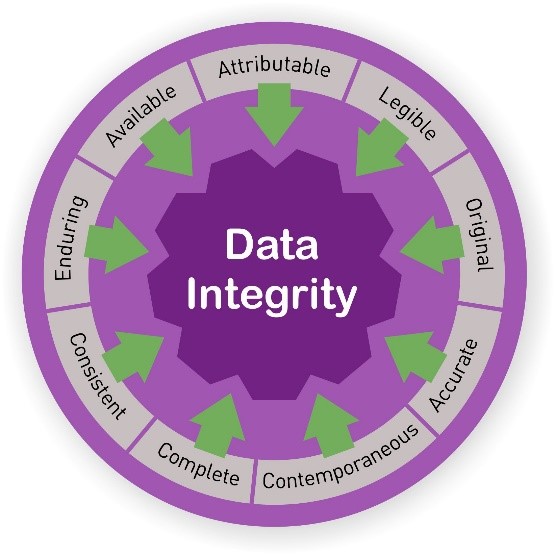Maintaining Data Integrity in the Lab With ELNs

Complete the form below to unlock access to ALL audio articles.
The US Food and Drug Administration (FDA) guidance on data integrity, issued in December 2018 (1), set new standards for all research companies. Under the new guidelines, “firms should implement meaningful and effective strategies to manage their data integrity risks”. A major concern of biopharmaceutical R&D executives is implementing these strategies in order to maintain data integrity throughout the entire drug discovery and development lifecycle – crucial for shortening drug time to market, avoiding unexpected expenses and preventing delays due to violations of data regulations.
Data should be attributable, legible, contemporaneously recorded, original or a true copy, accurate, consistent, available, enduring, and complete (ALCOA+) and these principles help to ensure that data security and integrity is observed and maintained.
Now, technology is helping laboratories to increase efficiency through automating highly repetitive tasks to reduce the incidence of human error. Storing and accessing data in one place, creating contingencies and filing all relevant documentation within context can save time and money, and assure data integrity.
Striving towards data integrity

Figure 1: The ALCOA+ principles.
Software in the laboratory
Here we break down each ALCOA+ principle and illustrate how all-in-one Electronic Lab Notebooks (ELNs) help to meet these standards:
Principle 1: Attributable
When using an ELN, every recorded document in the system is signed, dated and attributed to an identifiable person. An ELN keeps a log with examples of all personnel signatures and these witnessed records are stored in a long term ‘standard’ format PDF. Using a closed system ELN which has a unique, password-protected, multi-factor authentication (MFA) service, adds an additional layer of protection.
Principle 2: Legible
All data and metadata should be perpetual and easily read, ensuring information is kept accessible throughout the data lifecycle. Structuring data in a controlled and pre-defined format through an ELN enables laboratories to collect and analyse data in a methodical form, allowing researchers to find and retrieve data, as well as easily understand and compare results.
Principle 3: Contemporaneous
In order to assure data credibility, all data should be recorded at the time it was produced. Backdating data is forbidden by the FDA. An ELN helps to customize and automate a series of actions and events that occur in the lab, with time stamping built-in.
Principle 4: Original
Labs must ensure they have records of the original research data conducted. Any ELN you choose should maintain an audit trail for all system records where every change to the system is logged in a ‘histories’ table and time and date stamped for authentication.
Principle 5: Accurate
Every edit and update to the original data should always be documented. Data altered without annotations is considered inadequate and possibly fraudulent. An ELN ensures that no data is deleted, only updated and versioned, with built-in accuracy checks and verification controls.
Principle 6: Complete
Data should include all the results of an experiment, including repeated results and analyses performed. ELNs allow you to label your data and link between the data and metadata, keeping all information in the correct context. This ensures that all recorded data has an audit trail to show nothing has been deleted or lost.
Principle 7: Consistent
Data must be kept in the sequence it occurred, traceable (date/time stamped) and created in a repeatable and comparative form. Manual data entry exposes labs to potential human errors which can be eliminated by automating processes and calculations. Using automated workflows enforces consistency throughout the lab, ensuring that data is uploaded, processed and maintained in the same method.
Principle 8: Enduring
Data should be durable throughout its lifecycle and recorded on acceptable media – paper or electronic. ELNs automatically generate reports at each step, based on data added to the ELN, which can be produced instantly.
Principle 9: Available
Access to data for review or audit should be easy throughout the data lifecycle. By restricting all data to one platform, instead of multiple ones, all data is easily accessible to every authorized member of the lab.
Data integrity in the future
Having an understanding of the data integrity principles is the first step to protecting a company from potential Good X Practice (GXP) irregularities that may result in regulatory breach. In order to prevent problems, it is important to be able to demonstrate compliance.
Cloud-based ELNs and other laboratory management systems facilitate the homogeneity of data and high-quality standards. Automatically capturing and storing data creates more robust procedures for future research and supports reuse of data and reproducibility of experiments.
References
1. https://www.fda.gov/regulatory-information/search-fda-guidance-documents/data-integrity-and-compliance-drug-cgmp-questions-and-answers-guidance-industry
About the author:

Steve Yemm is CEO at BioData, a Digital Science company providing lab informatics products—including Electronic Lab Notebook, Lab Inventory, Chemical Registration and Biological Screening solutions—to biopharmaceutical and academic life sciences organisations in addition to other science based industries. The company’s solutions are powered by Labguru, a web- and cloud-based informatics platform. Prior to this, Steve held the position of Vice President of Sales at BioData and Digital Science and has over 20 years of experience selling and marketing solutions (software, services and automation systems) to science-based companies.

